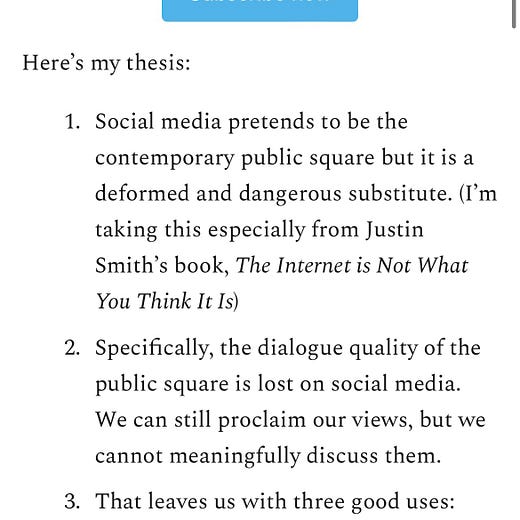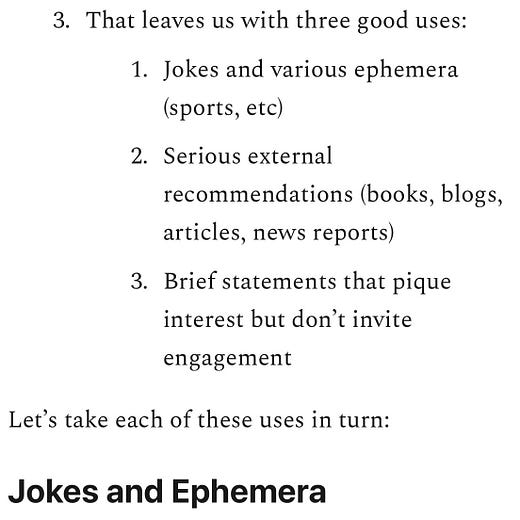Five Limitations of Twitter and Four Ideas For Using It Well
And the latest WWJT podcast
Hi all,
Joel Jacob and I have just posted our latest What Would Jesus Tech podcast that you can listen to on any podcast platform (like Apple and Spotify), on YouTube, or even right here on Substack.
There’s no transcription of the audio but here are some of the key points that I made.
I agree with Elon Musk that Twitter functions as a public square. Twitter shapes even those who never log in. See if you can make it more than ten minutes on cable news before they refer to a tweet. Twitter is worth our evaluation.
Five Limitations of Twitter Use
1 - Contextless Communication
The lack of context of a tweet causes us to question, "who was this written for?" and assumptions here lead to misunderstandings. Alastair Roberts speaks to this problem in this YouTube video:
2 - Skewed Representation
Twitter users don't reflect "the average citizen." People on Twitter are more likely to lean left and the people who post are more likely to be extreme in their ideology. And thanks to humanity's negativity bias we are more likely to read that crazy stuff. So we get a skewed view because of skewed people on an app with skewed representation.
3 - Political Polarization
When we see someone we follow dunk-tweet on some opposing view we think we're seeing the opponent's perspective but we often see the worst of the opponent's view. We think we're hearing the opponent & growing but we're not. See this Twitter thread from Tim Keller:
4 - Bad Habits
Twitter use can form bad habits. CS Lewis, on a kid reading the daily paper, said, "he will probably have acquired an incurable taste for vulgarity and sensationalism and the fatal habit of fluttering from paragraph to paragraph..."
From C.S. Lewis’ Surprised By Joy.
5 - Depression and Addiction
Twitter can make people more depressed, anxious, and just generally addicted. Like the numbing effect of a chocolate bar on a rainy day, it's a temporary hit but long-term does us no good and when in excess, without self-control, causes harm.
All that said, there's a place for Twitter. We just need to be mindful of its effects and uses.
Three Ideas For Using Twitter To The Glory of God
1 - Filter by Latest Tweets
Filter tweets by "latest tweets" and never (or rarely) filter by "Home." Click the stars in the top right of your app or web page to do this.
Car accidents get our attention. But the algorithm feeds you them endlessly, hooking you on what's good for Twitter's metrics but unhealthy for you.
2 - Read A Book
Read a book. Any book. Spend time unlearning a shortened attention span by following an argument or story in a longer form.
3 - What’s the Telos?
Ask yourself: what am I using Twitter for? Then ensure a) that your goal is worth pursuing, and b) that your use reflects your goal. This has led me to avoid the "What's trending" feature on Twitter.
Alan Noble has some helpful related thoughts here:
4 - Fruit of the Spirit
Practice the fruit of the Spirit. Ask yourself if Twitter is getting in the way of your growth. The fruit of the Spirit is love, joy, peace, patience, kindness, goodness, faithfulness, gentleness, and self-control. Jay Y Kim wrote about this in Analog Christian.
From Jay Y. Kim’s Analogue Christian
Conclusion
In 1st Corinthians 10:23, it says:
“I have the right to do anything,” you say—but not everything is beneficial. “I have the right to do anything"—but not everything is constructive.
We need to reflect on our use of technology. We need to ask: what’s more likely to happen when we sign in, do we use Twitter well to the glory of God or does it use us for the glory of big tech?








